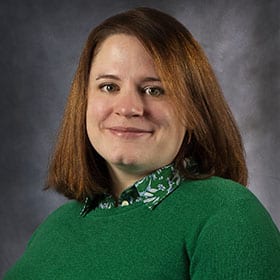Volunteer Lawyers Project Director
Nebraska State Bar Association
FOCUS
Working toward justice for all is a critical piece of building a Culture of Health. Shannon Seim is the director of the Nebraska State Bar Association’s Volunteer Lawyers Project (VLP). The VLP uses three pillar programs—case referrals, free legal clinics, and The Tenant Assistance Project—to assist victims of domestic violence and their children in escaping dangerous situations, to help families achieve economic stability and avoid homelessness, and to work with stakeholders to systematically address root causes of poverty and remove barriers for people living in poverty through legal interventions.
STRATEGIC INITIATIVE: Mental Health Advance Directives
My strategic initiative will be focused on mental health advance directives. These are similar to end-of-life advance directives (where people write if they’d want to be on life support, resuscitated, etc.), but they are for those who experience episodic disorders (schizoaffective disorder, bipolar disorder) or who will experience degenerative competency disorders (Alzheimer’s, dementia). These directives are instructions for care that are legally binding and are governed by state law. Some states don’t have laws to empower the documents. Some states have very outdated laws. The National Resource Center on Advanced Directives has done a lot of work but would like to expand that by broadening the pipeline to advanced directives. Right now, even in states where good laws exist, people don’t know the documents are available, and they can’t afford an attorney who will draft one. I believe that drafting these documents should be a tool that every mental health provider can offer to patients who would benefit.
MORE ABOUT SHANNON
Shannon enrolled in law school after seeing firsthand housing injustices as a community education professional who did in-home programming with immigrant and refugee families. She was also inspired to pursue a career in law because she was the advocate for a loved one experiencing a mental health crisis and realized that legal issues were the most significant barrier to accessing mental healthcare.

